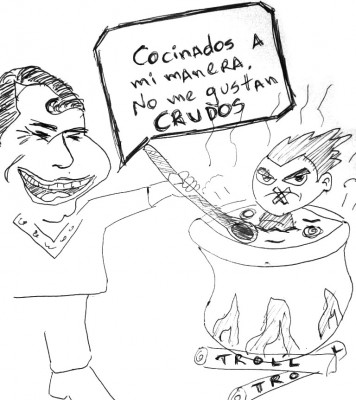
Image by the author, used with permission.
The public battle between social media satirists Crudo Ecuador and Ecuadorian President Rafael Correa continues.
Que soy financiado, pagado a tiempo completo, que tengo un software de inteligencia, que soy parte de la restauración conservadora, y todos mis otros “secretos”… escúchelos aquí :)
Posted by Crudo Ecuador on Saturday, January 17, 2015
That I am funded, paid for full-time work, I have intelligence software, I'm part of the conservative restoration, and all my other “secrets” … listen to them here :)
After sending a threatening gift of flowers and exposing the individuals behind Crudo Ecuador, however, the Internet satirists surrendered, using the hashtag #UstedGanó (#YouWon).
Bueno señores, hasta aquí llegó todo.Gracias a todos los que moralmente me apoyaron en este proyecto, pero no puedo…
Posted by Crudo Ecuador on Thursday, February 19, 2015
Well, gentlemen, everything's come to this. Thanks to everyone who supported me morally in this project, but I can not …
On February 25, the Inter-American Commission on Human Rights posted a statement urging the Ecuadorian government to protect the rights of the individuals behind Crudo Ecuador, as well as their families’ rights.
Además, la Relatoría Especial recuerda que “[t]anto el derecho a la libertad de pensamiento y expresión como el derecho a la vida privada protegen al discurso anónimo frente a restricciones estatales. La participación del debate público sin revelar la identidad del emisor es una práctica usual en las democracias modernas. La protección del discurso anónimo favorece la participación de la personas en el debate público ya que –al no revelar su identidad— pueden evitar ser objeto de represalias injustas por el ejercicio de un derecho fundamental”.
Furthermore, the Special Rapporteur highlights “the right to freedom of thought and expression, as well as the right to privacy and anonymity against state restrictions. Participating in public debates without revealing one's identity is a common practice in modern democracies. The protection of anonymous speech cultivates individuals’ participation in public debates, as concealing their identity can protect them against unfair retaliations for exercising their fundamental rights.”
Nationally, few civil-society organizations have joined the Manifesto for the Freedom of Expression, Anonymity, and Online Privacy in Ecuador, though several international organizations have signed.







3 comments